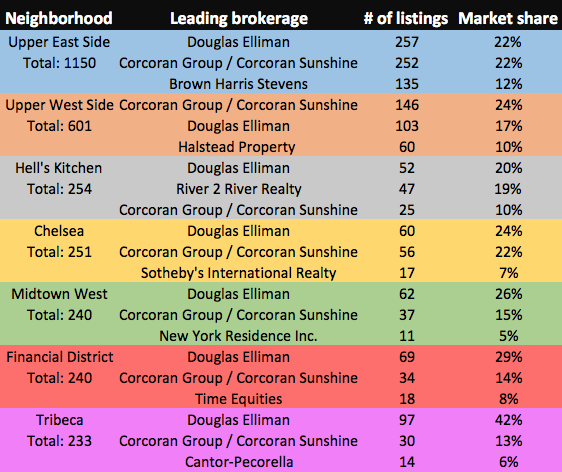New York brokers love to win, and only the most talented and dedicated hustlers thrive.
The firms that employ them are no different, fighting borough-by-borough, neighborhood-by-neighborhood, building-by-building and unit-by-unit in hopes of locking down as many of the listings as possible, and crushing their competition.
The Real Deal compared top brokerages citywide in its May issue, but those results tell only part of story.
To get the view from the trenches, TRD drove into active sales listing data — both resales and new development — from On-Line Residential to determine which brokerages were winning which Manhattan neighborhoods.
Douglas Elliman, by far the city’s largest brokerage with over 2,000 agents in Manhattan, fully topped the charts in six of the seven neighborhoods TRD analyzed (those with the largest number of total sales listings).
It dominated some – for example Tribeca, where it had a striking 42 percent market share – but just squeaked by in others, such as the Upper East Side, where it beat rival Corcoran Group / Corcoran Sunshine by just five listings of a total 1,150, or about 0.3 percent of the submarket.
The two Corcoran firms, with a combined 1,100 agents in Manhattan — had a strong showing on the Upper West Side – the second largest neighborhood by listings, with 601 – where it had a solid 24 percent market share on 146 total listings, compared to a 17 percent share on 103 listings for Elliman.

Source: TRD analysis of OLR listings data
Elsewhere though, the Corcoran brokerages were mostly forced to settle for second place. Only in Hell’s Kitchen did a third firm break into the top two slots. River 2 River Realty, which is based in the neighborhood, had 47 listings, or 19 percent of the submarket.
Still, the firm put up a stiff challenge to Elliman overall, considering its far lower agent count. Corcoran – which does more new development business than its rival, and also has a stronger presence in Brooklyn – also performed better in neighborhoods with more total listings, while Elliman dominated less active areas.
The competition for third place highlighted a more diverse set of players, with seven different firms appearing in each of The Seven Third Place slots. Brown Harris Stevens and Halstead Property showed in the largest two neighborhoods by listings, the Upper East and Upper West Sides, with market shares of 12 percent and 10 percent, respectively.
Some caveats: OLR data has holes, so while roughly accurate, it isn’t a perfect representation of listing activity. In addition, the results are based on a one-day snapshot of active listings taken on March 27, as was TRD’s citywide analysis. That means units listed since that date and units that were in contract or recently sold as of that date were not included.
